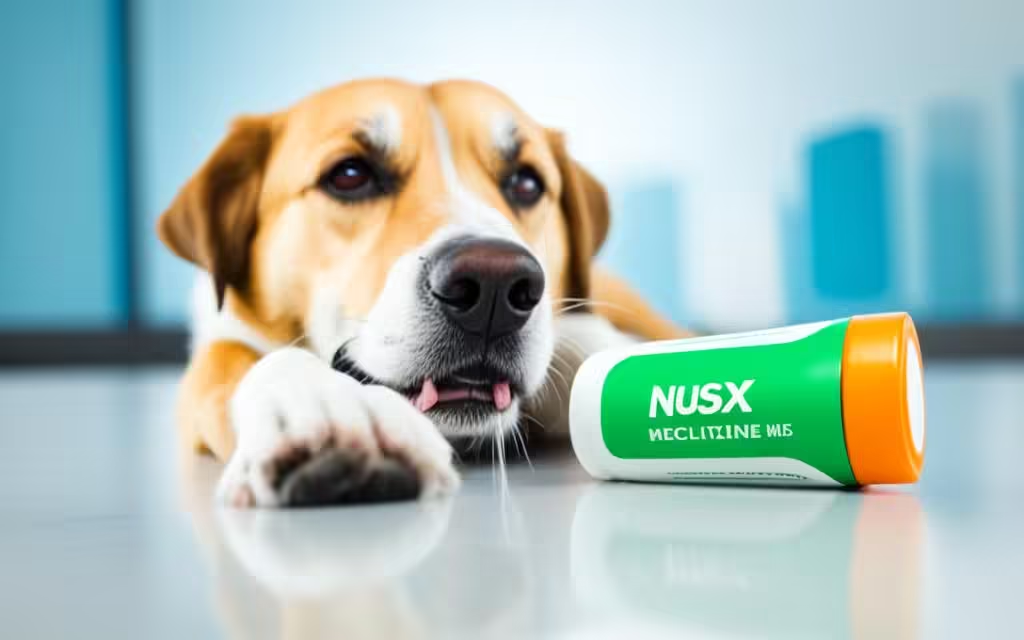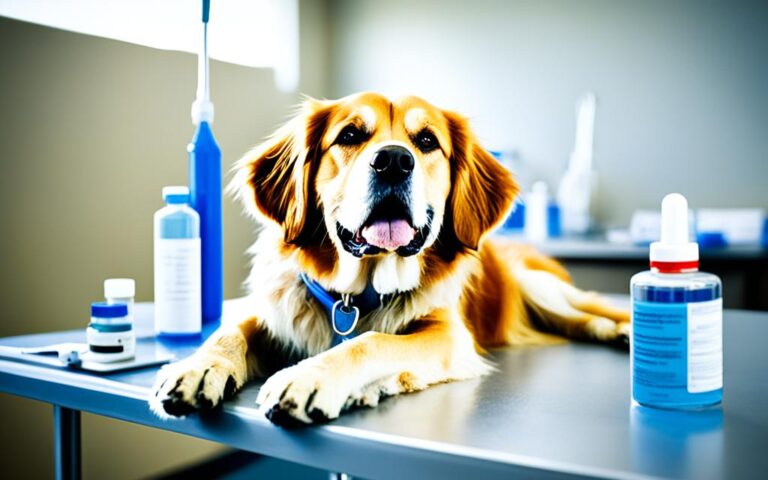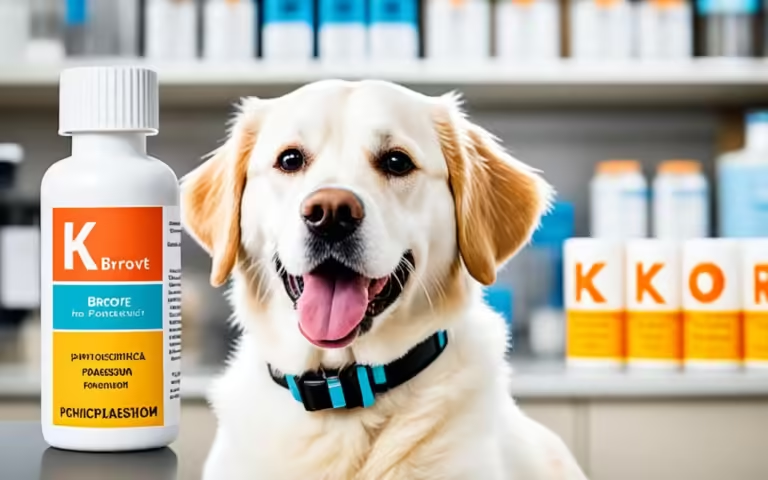Meclizine (NausX®) for Dogs: Motion Sickness Relief
About 1 in 5 dogs get motion sickness, which can make them feel sick and throw up when they travel1. Luckily, there’s a vet-approved way to help: Meclizine, found in NausX® for dogs. This medicine has been trusted for years to ease motion sickness and other issues in dogs, keeping them comfy on trips.
Key Takeaways
- Meclizine is an FDA-approved human medicine used for dogs, cats, rabbits, and other small animals to fight motion sickness and dizziness1.
- NausX® is a special version of meclizine for dogs, with different types for small, medium, and big breeds12.
- Meclizine stops the signals from the inner ear to the brain that cause nausea and vomiting1.
- You can give meclizine as a chewable tablet, with the right amount and how often depends on the dog’s size and health2.
- Meclizine is usually safe but might make some dogs sleepy, dry-eyed, or have a fast heart rate. Use it carefully if your dog has health issues1.
Table of Contents
What is Meclizine?
Meclizine is a type of antihistamine used to prevent and treat motion sickness in humans and animals, including dogs1. It’s not officially approved for pets by the FDA but vets use it to help with motion sickness and balance issues1.
Understanding Meclizine and Its Uses
Meclizine stops signals from the inner ear to the brain, reducing nausea and vomiting1. It’s the same ingredient found in human meds like Antivert® and is used for motion sickness in dogs and cats3. This drug has several effects in dogs and cats, including reducing nausea and calming the nervous system3.
FDA Approval and Compounded Formulations
Meclizine is approved for people under the name Antivert®, but not for pets1. Yet, vets can legally use it for animals in certain situations, known as “off-label” use1. Sometimes, vets suggest a special form of meclizine made by a pharmacist for a pet’s specific needs1.
| Meclizine (NausX®) Product Details | Information |
|---|---|
| Active Ingredient | 2Meclizine HCL (Meclizine Hydrochloride) in each chewable tablet: 25 mg |
| Dosage Instructions | 2Give one tablet 30 minutes before traveling |
| Duration of Effects | 2Approximately 6 hours |
| Maximum Doses in 24 Hours | 2Do not exceed two doses |
| Weight Limitation | 2For dogs 26-75 pounds only |
| Inactive Ingredients | 2Croscarmellose sodium, dicalcium phosphate dehydrate, magnesium stearate, etc. |
| Manufacturer | 2Distributed by Goldman Pharmaceutical Group Inc., Holbrook, NY 11741 |
| Contact | 2800.981.7642 petsotc.com |
| Country of Origin | 2Made in America |
| Product Name and Type | 2NausX®(Meclizine HCl, USP 25 mg) Antiemetic, OTC ANIMAL DRUG |
| Route of Administration | 2ORAL |
| Meclizine Hydrochloride Strength | 225 mg |
| Tablet Size | 28mm |
| Tablet Color | 2Pink |
| Tablet Shape | 2Round (biconvex tablet with bisect) |
| Tablet Flavor | 2Natural and artificial flavors included |
| Marketing Start Date | 203/01/2019 |
| Packaging | 210 in 1 BLISTER PACK |
| Marketing Category | 2UNAPPROVED DRUG OTHER |
Meclizine is approved for people under the name Antivert® and is part of Dramamine® Less Drowsy and Bonine®, but not for pets1. Sometimes, vets prescribe special meclizine forms for pets when regular drugs won’t work132.
How Meclizine Works for Dogs
Meclizine’s Mechanism of Action
Meclizine is an H1 receptor blocker found in NausX®. It blocks histamine, a key chemical in the stomach4. This stops histamine from sending signals that cause nausea and vomiting4.
Meclizine stops signals from the inner ear to the brain that cause motion sickness4. This helps dogs feel better when they’re sick from motion.
Dogs with motion sickness may drool a lot, feel restless, or even vomit5. Young dogs often get it because their inner ear isn’t fully developed yet5. Meclizine blocks the signals that make them feel sick, helping them and their owners during trips.
Meclizine HCl is a chewable tablet for dogs to prevent and treat motion sickness6. It works for about 6 hours and shouldn’t be given more than twice in 24 hours for dogs up to 75 pounds6.

Knowing how meclizine works helps pet owners and vets use it safely and effectively. It’s a key tool for managing motion sickness in dogs.
Administering Meclizine to Dogs
Meclizine, also known as NausX®, is a common medicine for dogs with motion sickness7. Vets give meclizine based on the dog’s weight and the condition it treats. The usual dose is 12.5-25 mg, given 30-60 minutes before travel or as needed for other conditions7. You can give meclizine with or without food, but food might help prevent stomach upset7. Your vet will tell you how often and for how long to give it.
Dosage and Frequency Guidelines
7 Meclizine comes in different strengths for dogs: 12.5 mg, 25 mg, 30 mg, and 50 mg tablets, and 25 mg capsules7. The dose depends on the dog’s weight: 0 – 5kg, 6 – 20kg, and 20kg+7. Give meclizine to dogs 30 – 60 minutes before they travel. It works for three to six hours after taking it.
Missed Dose Instructions
If you forget to give meclizine, give the dose as soon as you remember8. But, if it’s almost time for the next dose, just skip the missed one and go back to the regular schedule8. Never give your dog two doses at once to avoid side effects8. If unsure, call your vet for advice on a missed dose of meclizine.
Always follow your vet’s instructions when giving meclizine to your dog8. The right dose and following the vet’s plan are key for safe and effective use of this medicine for motion sickness or other dog health issues897.
Potential Side Effects and Precautions
Meclizine, found in NausX®, is usually safe for dogs. But, pet owners should watch for side effects. These can include drowsiness, sleepiness, dry eyes, and a faster heart rate10. If your dog shows any of these signs, stop the medicine and call your vet right away10.
Don’t give meclizine to pregnant dogs or puppies under 6 months old11. Also, be careful with dogs who have certain health issues. These include an enlarged prostate, spinal disease, severe heart disease, bladder cancer, urinary obstruction, glaucoma, liver disease, seizure disorders, or those on other meds like fluoxetine, metoclopramide, or other antihistamines11. Vets will weigh the risks and benefits before giving meclizine to these dogs.
Contraindications and Interactions
Don’t use meclizine on pets allergic to it or similar drugs, newborn pets, or those getting skin tests soon4. Be careful with pets having glaucoma, seizures, high thyroid levels, heart disease, high blood pressure, enlarged prostate, stomach or urinary blockage, and breathing problems4.
Be cautious when mixing meclizine with some other drugs like anticholinergic drugs, central nervous system depressants, or tricyclic antidepressants4. Also, stop meclizine at least 2 weeks before allergy tests4.
Vets will think about these possible issues when giving meclizine, or NausX®, to dogs. They want to make sure it’s safe and good for them10411.
Meclizine (NausX®) for Dog Motion Sickness
Meclizine, known as NausX® for dogs, is a great way to prevent and treat motion sickness in dogs6. It works by stopping signals from the inner ear to the brain, which helps reduce nausea and vomiting during car rides1. Vets often suggest it for dogs that get sick from car rides, and it should be given 30-60 minutes before traveling6.
NausX for dogs has meclizine HCL, 25mg, as its main ingredient6. It’s for dogs between 26 to 75 pounds6. The effects last about 6 hours6. Don’t give more than two doses in 24 hours for dogs in this weight range6.
About 7.2 million dogs got motion sickness in 2006, but only 1.8 million got vet help12. Young dogs, especially puppies, are more likely to feel car sick because their balance system is still developing12. Most puppies stop feeling motion sick by their first year, but some may still have it12.
Meclizine is also used for dogs with dizziness from ear problems1. But, the NausX® for big dogs doesn’t have meclizine. Instead, it has dimenhydrinate1. Small breed dogs get a version with meclizine1.
Meclizine is FDA-approved for people, but not for dogs1. It’s in some human medicines like Antivert® and Bonine®1. But, these aren’t for dogs1. It works by blocking a part of the brain to stop nausea and vomiting1.
Talk to a vet before giving meclizine to your pet, as it’s not safe for all conditions1. Side effects include sleepiness, dry eyes, and fast heart rate1. Don’t give it to pregnant dogs or puppies under 6 months1. If your pet takes too much, get vet help right away1.
Keep meclizine in a cool place, between 68–77 F1. Store it in a dry place, between 20 – 25°C (66 – 78°F)6. It’s chewable, pink, and comes in packs of 10 tablets6. The packaging shows when it was made and sold6. It’s an over-the-counter drug for pets6.
“Meclizine is an effective medication for the prevention and treatment of motion sickness in dogs, helping to reduce nausea, vomiting, and other associated symptoms.”
In conclusion, meclizine, as NausX® for dogs, is a key tool for managing motion sickness. Knowing how to use it safely and effectively can make trips better for dogs.
Treating Vestibular Disease with Meclizine
Vets may use meclizine (NausX®) to help dogs with dizziness and nausea from vestibular disease13. This disease is a group of conditions that make dogs lose their balance and get disoriented, often called “old dog syndrome.”13 Meclizine can stop abnormal signals from the vestibular system to the brain, easing symptoms and improving life quality13.
Most dogs over seven years old get peripheral vestibular disease13. Signs include losing balance, tilting their head, moving their eyes strangely, and feeling sick or vomiting13. Luckily, most dogs start to get better in 2 to 3 days13. But, some might take up to six weeks to fully recover13.
Causes of this disease include ear infections, viral infections, or neck injuries13. Treatment includes rest, anti-nausea drugs like meclizine (NausX®), and sometimes steroids13. Omega 3 supplements can also help heal and prevent future problems13.
Central vestibular disease affects the brainstem and shows different symptoms13. It can be caused by brain damage, infection, or other illnesses13. Only a vet can figure out the type of disease by looking at symptoms and doing tests13.
Knowing about the types of vestibular disease and how meclizine (NausX®) helps, pet owners can work with vets to care for their dogs13.

| Meclizine Brand Names | Primary Uses | Dosage Recommendations |
|---|---|---|
| Antivert, Dramamine II, Simply Motion | Motion sickness relief in dogs, targeting symptoms like nausea, vomiting, and dizziness | 25 to 100 milligrams per day in divided doses for adults suffering from vertigo |
Meclizine is not just for motion sickness in dogs; it’s also good for vestibular disease11. By understanding how it works and its side effects, pet owners and vets can give the best care to dogs with vestibular issues1114.
“Meclizine is a powerful tool in our arsenal for managing vestibular disease in dogs, helping to alleviate the distressing symptoms and improve their quality of life.”
– Dr. Emma Lowe, Veterinary Neurologist
It’s key to watch how a dog reacts to meclizine (NausX®) and look out for bad side effects14. Pet owners should work with their vets to use this drug safely and effectively for dogs with vestibular disease1114.
Comparing Meclizine to Other Anti-Nausea Drugs
Meclizine (NausX®) and dimenhydrinate (found in Dramamine®) are both used to help dogs with motion sickness. But, they are not the same. Dimenhydrinate can make dogs sleepier, which might be good or bad15. Meclizine is often seen as better for motion sickness and problems with balance in dogs15.
Dimenhydrinate (Dramamine®)
Dimenhydrinate, the key part of Dramamine®, is also used for dogs with motion sickness. It can work well, but it might make dogs sleepier than meclizine15. This could matter if you want your dog to stay awake and active when traveling or doing other things.
Cerenia (Maropitant Citrate)
Cerenia (maropitant citrate) is a drug that helps prevent and treat vomiting in dogs, including from motion sickness. It’s different from meclizine, focusing on the brain’s vomiting center instead15. Cerenia was the first drug approved by the FDA for dogs, offering an alternative to meclizine in some cases.
| Medication | Mechanism of Action | Onset of Action | Duration of Effect |
|---|---|---|---|
| Meclizine (NausX®) | Acts on the vestibular system | 30-60 minutes | Up to 6-8 hours16 |
| Dimenhydrinate (Dramamine®) | Antihistamine, sedative properties | 30-60 minutes | 4-6 hours |
| Cerenia (Maropitant Citrate) | Blocks neurokinin-1 receptor | 30-60 minutes | 24 hours |
In summary, meclizine, dimenhydrinate, and Cerenia all help with motion sickness and nausea in dogs. But, they work differently and last for various times. Owners and vets should think about these differences when picking the best medicine for their dog151617.
Essential Drug Information
Meclizine, known as NausX®, is a key medicine for dogs. It helps prevent and control nausea, vomiting, and dizziness from motion sickness11. Even though it’s not FDA-approved for pets, vets often use it to help dogs1.
This drug is an antihistamine that stops certain chemical messengers in the stomach from reaching the brain’s center for vomiting1. It’s a good choice for dogs with motion sickness and vestibular disease1.
The right dose of meclizine depends on the condition being treated. Adults usually start with 25 to 50 milligrams an hour before traveling11. But, dogs need a different dose based on their size and weight, so a vet should decide11.
Meclizine is usually safe for pets, but it can cause drowsiness, fast heartbeat, skin rash, vomiting, and dry mouth11. Always follow your vet’s advice to avoid these side effects11.
Keep meclizine in a sealed container at room temperature, away from heat, moisture, and light11. Make sure it’s out of children and pet reach to stop them from taking it by mistake11.
| Key Drug Facts | Details |
|---|---|
| Common Names | Meclizine, NausX® |
| Drug Type | Antihistamine, Antiemetic |
| Used For | Motion sickness, vestibular disease |
| Administered | Oral tablets |
| FDA Approved | No, but used off-label |
| Mechanism of Action | Blocks signals from vestibular system to vomiting center in brain |
“Meclizine is used in veterinary medicine for the treatment and prevention of motion sickness in dogs and to treat dizziness associated with vestibular disease in various small animals such as dogs, cats, rabbits, rodents, among others.”1
Drug Storage and Safety
Storing and keeping safe meclizine (NausX®) for your dog is key. Keep it in a cool, dry place, between 68-77°F, in a sealed container14. If you have a special mix, follow the advice from the pharmacy11.
Keep meclizine (NausX®) away from kids and pets to avoid mistakes or too much medicine11. If you think your dog took too much, call your vet or a poison help line right away11. Even though bad reactions like seizures are rare14, watch your dog closely for any signs of trouble. If you see anything bad, get help from a vet.
By storing it right and being careful, you can make sure meclizine (NausX®) works well for your dog’s motion sickness11. Always keep it safe and talk to your vet if you have any worries14111.
Conclusion
Meclizine, known as NausX®, is a safe and effective way to help dogs with motion sickness and vestibular disease18. It works by stopping signals from the inner ear to the brain’s center that controls vomiting. This can reduce nausea, vomiting, and other symptoms dogs get from motion sickness and vertigo19. Vets often give meclizine to dogs with motion sickness or vestibular problems. They give the right amount and watch for any side effects.
Using meclizine (NausX®) helps dogs feel better from symptoms like whining, yawning a lot, drooling, nausea, vomiting, and being very tired20. It’s especially good for dogs that easily get motion sickness, like Boxers, Border Terriers, Dachshunds, and Golden Retrievers18. With a vet’s guidance, meclizine can make dogs more comfortable when traveling and better in their daily life.
In short, meclizine (NausX®) is a trusted medicine for dogs with motion sickness and vestibular disease. Knowing how it works, how much to give, and possible side effects helps pet owners and vets make sure dogs travel without stress.
FAQ
What is Meclizine?
How does Meclizine work for dogs?
Is Meclizine FDA-approved for use in dogs?
How is Meclizine administered to dogs?
What are the potential side effects of Meclizine in dogs?
How is Meclizine (NausX®) used to treat motion sickness in dogs?
Can Meclizine be used to treat vestibular disease in dogs?
How does Meclizine compare to other anti-nausea medications for dogs?
Source Links
- Meclizine (NausX®) for Dogs and Cats
- NausX®
- Meclizine for Dogs: Solutions for Motion Sickness or Vertigo
- Dimenhydrinate | VCA Animal Hospitals
- Dramamine for Dogs: Treating Motion Sickness, Dosing & Side Effects
- NausX®
- Meclizine For Dogs – THE Solution for Canine Car Sickness
- Dog Car Sickness: Natural Remedies, Nausea Medicine & More Tips For Puppies Throwing Up
- Preventing Motion Sickness in Dogs
- Cerenia
- Meclizine (Oral Route) Side Effects
- Preventing & Treating Motion Sickness in Dogs | Preventive Vet
- a Veterinarian Guide for Dog Owners
- Bonine Oral: Uses, Side Effects, Interactions, Pictures, Warnings & Dosing – WebMD
- Appetite Stimulants for Dogs
- 6 Best Dog Anti-Nausea Products
- Dog Car Sickness Remedies: Medicines & Natural Remedies
- Why Pets Get Carsick and How to Help Them – Pet Travel Blog – Resource for Transporting Pets
- Vestibular Disease in Dogs: Doggy Vertigo
- Dramamine For Dogs: Everything You Need To Know







